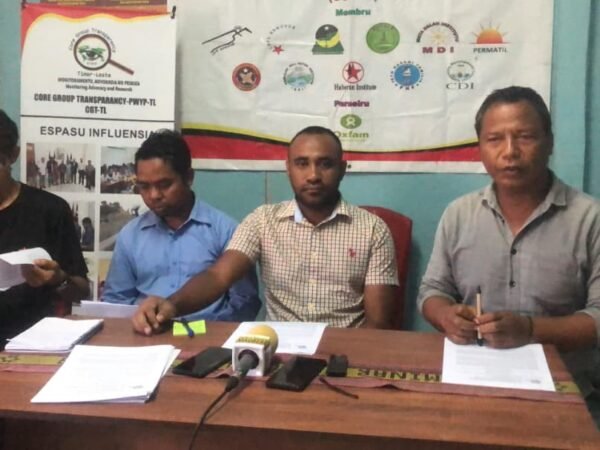Dili, November 7 2025 (Média Democracia) – Core Group Transparency Timor-Leste (CGT-TL) issued a press release regarding the 2026 State Budget (OJE 2026) to discuss its analysis and monitoring of the Government and National Parliament. The press conference was held at the CGT-TL hall in Caicoli, Dili.
The National Coordinator and spokesperson of CGT-TL, Jemicarter Moniz dos Reis, stated in the press release that while CGT-TL recognizes some progress in transparency and public participation, significant challenges remain.
“CGT-TL appreciates the Ministry of Finance’s efforts to promote transparency, including publishing documents such as the OJE 2026 Circular, Budget Statement, citizen consultation reports, and draft law proposals, and involving civil society in certain presentation sessions,” said Jemicarter Moniz dos Reis.
However, the spokesperson noted that many ministries still fail to practice transparency and public participation. Information on the OJE 2026 content is not fully available online, and the preparatory process has largely excluded key stakeholders, such as civil society, academics, and the private sector. This limits opportunities for citizens’ ideas to shape a budget aligned with Timor-Leste’s reality.
Regarding productive sectors, CGT-TL observed that the government continues to highlight areas such as agriculture, horticulture, coffee, industrial plants, livestock, veterinary services, fisheries, forestry, handicrafts, informal economy, agro-tourism, community tourism, home industries, and small-scale industries. Yet, in practice, these sectors do not receive direct prioritization in the budget. The OJE 2026 remains dominated by consumptive expenditures rather than productive investments, showing inconsistencies between political rhetoric, written documents, and budget allocations.
“Timor-Leste faces fiscal stress and potential crises, as the Petroleum Fund will experience reduced withdrawals while the government continues to rely on it heavily. If this situation continues, the country will face fiscal deficits over the next decade,” Jemicarter Moniz dos Reis warned.
CGT-TL emphasized that past experiences, such as in 2015 and 2018 show that heavy dependence on oil revenues and global market fluctuations threaten economic stability. Despite large-scale infrastructure projects like the Tasi Mane project, investments in productive sectors remain limited, neglecting areas that directly support the livelihoods of the Timorese people.
The spokesperson called on the government to prioritize productive and sustainable sectors in the 2026 State Budget, including agriculture, education, health, clean water, tourism, fisheries, and small-scale industry. CGT-TL also urged the government to reduce unnecessary consumption expenditures, reassess costly projects with unclear benefits, and evaluate state-owned enterprises that do not contribute significantly to state revenue.
CGT-TL reaffirmed its commitment to continue monitoring public finance management in Timor-Leste, promoting transparency, accountability, and participation, together with partner organizations including La’o Hamutuk, Etadep, Yayasan HAK, Mata Dalan Institute (MDI), Fundasaun Haburas, Luta Hamutuk, Fundasaun Hadomi Familia (FHF), Fundasaun Baloos, Community Development Interest (CDI), Kadalak Suli Mutuk Institute (KSI), Petroleum Engineers Association of Timor-Leste (AEPTL), Raes Hadomi Timor Oan (RHTO), Esperansa Feto Defisiensia Association (AEFD), Permatil, Haberan Institute, and Irmão Solidario Association (AIS).
Report: Nelfiano
Photo: Nelfiano

